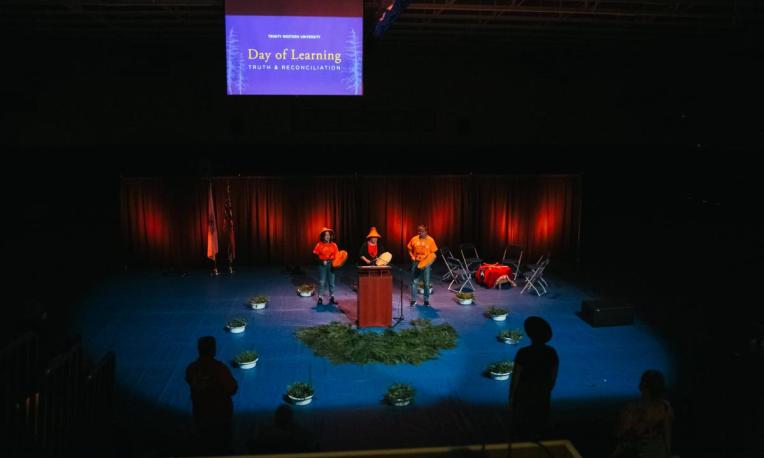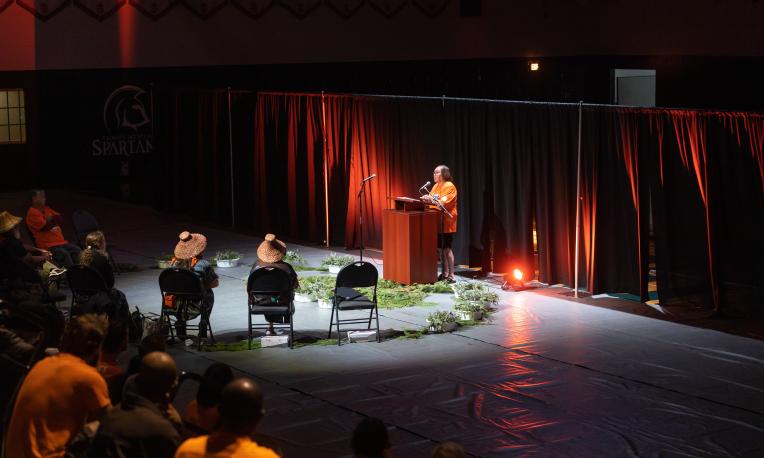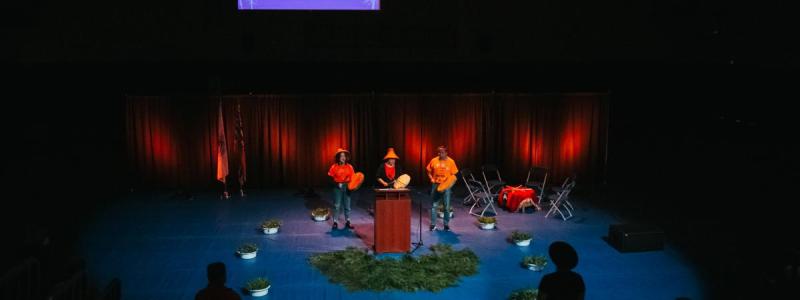In honour of Canada’s National Day for Truth and Reconciliation, Trinity Western University is hosting a campus-wide Day of Learning on Sept. 29, 2023. We invite students, staff, and faculty to participate as together, we commemorate the history and legacy of residential schools and foster greater understanding of Indigenous knowledge and culture.

What is the Day of Learning?
Canada's National Day for Truth and Reconciliation on Sept. 30 honours the Indigenous victims and survivors of residential schools, as well as their families and communities. TWU joins with people across Canada in public commemoration of the painful history and ongoing impact of residential schools by hosting a Day of Learning on Friday, Sept. 29.
We encourage students, staff, and faculty to attend, as we foster greater knowledge and understanding of Canada’s Indigenous cultures and walk together in this reconciliation process.
How do I prepare for the Day of Learning?
- You are invited to wear an orange shirt to the Day of Learning, and you are encouraged to bring a pair of children’s shoes (gently used or new) that we will use in ceremony during Opening the Circle. The shoes will then be donated to children in need.

Program
9 a.m. | Opening the Circle | David E. Enarson Gymnasium
We begin the day together at 9 a.m. with an Opening the Circle to start the day with Stó:lō protocol and ceremony. The purpose of gathering is to learn and grow in our understanding of the history and legacy of Indian residential schools, and to honour the survivors, their families, and communities. University Siya:m Patricia Victor Switametelót, Stó:lō, along with several Indigenous elders and leaders, will lead us in our time together.
1–3 p.m. | Learning Activities | Langley campus various locations
Workshops and learning opportunities will be available in the afternoon 1–3 p.m. throughout the Langley campus. Activities run concurrently, commencing at 1 p.m. See below for the list of activities.
- Oral Tradition | Kuhn Centre Room 115/116 Global Lounge
Indigenous peoples have long passed on knowledge from generation to generation through oral traditions, including storytelling. Storytelling is a traditional method used to teach about cultural beliefs, values, customs, rituals, history, practices, relationships, and ways of life. It is a foundation for holistic learning, relationship building, and experiential learning. Join the sharing circle as Elders and Knowledge-keepers share their stories.
- Indigenous Literatures Matters | Kuhn Centre Room 203
English literature instructor Jan Lermitte will share her reflections as a non-Indigenous settler scholar who teaches Indigenous literatures. She will also invite you to join in conversations and activities about the importance of Indigenous literatures; the value of storytelling (both written and oral) for increasing our ethical and moral response to injustice, oppression, and racism; and the significance of including Indigenous Ways of Knowing in our learning.
- Blanket Exercise | Fraser Hall Lounge
This is an interactive educational program that teaches the history of Indigenous peoples in Canada. The program was created in response to the 1996 report of the Royal Commission on Aboriginal Peoples and is used as a teaching tool across Canada. Please bring a blanket. Led by Bridget Findley, MCC Indigenous Neighbors Coordinator.
- Family Story with Tanner Timothy | West Coast Collegium
Former TWU student Tanner Timothy of Sliammon First Nation will share his family story in the space where his father, Jackie Timothy's carving is displayed for TWU to enjoy. He is a master carver and descends from the Hereditary Chief lineage of his village.
- Movie: Indian Horse | DeVries Auditorium
Indian Horse is the story of Saul Indian Horse, an Ojibway boy from northern Ontario who escapes his demons and rough childhood through hockey. Saul is taken to St. Jerome’s Indian Residential School. It is a film adaptation of the story written by Richard Wagamese, Ojibwe.
- Movie: We Were Children | Neufeld Science Centre Block Hall
We Were Children is the testimony of two survivors, Lyna Hart and Glen Anaquod. In 1958, Lyna was taken from her family to a school in central Manitoba, while Glen, who was orphaned, entered a school in Saskatchewan. Together, they are part of seven generations of children who were betrayed, broken and abandoned. Their voices were silenced for decades by force and by fear, and they now emerge, powerful and clear, preserved for generations to come.
- Restorative Research Practices | Kuhn Centre Room 434
Kathleen Lounsbury, Kwakiutl, will share her journey of learning at TWU's School of Nursing and how restorative research practices have impacted her own research and community. Lounsbury comes from the traditional Kwakwaka'wakw territories of Alert Bay, B.C. She is a part-time instructor, consultant for curricular Indigenous integration, and a PhD student in TWU's School of Nursing.
- The Tree of Life: A Red Cedar Walk | Meet at the RNT side of the Outdoor Chapel
Red cedar is the most spiritually important of plants to Stó:lō peoples and their neighbours. Walk with us in the Ecosystem Study Area as we learn from and about the tree of life. Led by Malila Giroux, Stól:ō and the TWU ConVersing/ConServing research team.
- Decolonizing through Art | Norma Alloway Library SAMC Gallery
Bear Barnetson is a multidisciplinary emerging artist from Nadleh Whut’en, the Dakelh nation, and of the Duntem’yoo Bear clan. Through the works included in Decolonizing the Nativity, Barnetson seeks to “hold the stories and understandings of Indigenous peoples alongside the story of Jesus’ birth.” Braiding together Indigenous story, Biblical nativity accounts and contemporary events through the powerful language of West Coast art, Barnetson breathes new life into the nativity story which is so often portrayed in ways that are Eurocentric and detached from present realities.
- Family Sharing Circle | Kuhn Centre Room 204
Indigenous peoples have long passed on knowledge from generation to generation through oral traditions, including storytelling. Storytelling is a traditional method used to teach about cultural beliefs, values, customs, rituals, history, practices, relationships, and ways of life. It is a foundation for holistic learning, relationship building, and experiential learning. Join the sharing circle as this family shares their stories.
- Learning to walk together in a good way: Indigenous-Settler Relations | Kuhn Room 402
One core value of Indigenous people is relationships—relationships between individuals, families and communities as well as relationships with the land and the ancestral and spiritual realm. We are all related is key to understanding Stól:ō worldview and learning to walk together in a good way. Led by Dr. Bruce Shelvey, co-director of the Institute of Indigenous Issues and Perspectives at TWU.
- Intergenerational Trauma | Kuhn Centre Room 221
Our elders remind us that the mass removal of children from Aboriginal communities is like ripping the heart and centre out of Indigenous worlds. Once the heart was taken, everything else began to and fall away: elders had no one to teach, women had no one to care for, and men had nothing to protect and provide for. This created the conditions for the unravelling that communities struggle with to this day. Geraldine Coon and her parents attended Indian Residential School. She will share her story of intergeneration impacts on her family and community.
- Shoe Project | Outdoor Chapel
Led by small group leaders, this outdoor activity will commemorate the Indigenous victims and survivors of residential schools, as well as their families and communities.
3 p.m. | Closing the Circle | David E. Enarson Gymnasium
Following the afternoon of learning activities, once again we will gather together in the Gym at 3 p.m., ending the day with Stó:lō protocol.
See the livestream for Day of Learning
About Indigenous Initiatives at Trinity Western University
At TWU, we seek to hear, understand and acknowledge our shared history with Indigenous peoples and the impact that it continues to have throughout the generations. As a global Christian university, TWU continues to foster greater knowledge and understanding of Indigenous cultures, worldview, and history among students, staff, and faculty. We do this by providing educational opportunities, engaging in community partnerships, and through caring for and supporting Indigenous students.
Learn more at TWU's Indigenous Initiatives.
About Trinity Western University
Founded in 1962, Trinity Western University is Canada’s premier global Christian liberal arts university. We are dedicated to equipping students to discover meaningful connections between career, life, and the needs of the world. Drawing upon the riches of the Christian tradition, seeking to unite faith and reason through teaching and scholarship, Trinity Western University is a degree-granting research institution offering liberal arts and sciences as well as professional schools in business, nursing, education, human kinetics, graduate studies, and arts, media, and culture. It has campuses in Canada in Langley, Richmond, and Ottawa. Learn more at www.twu.ca or follow us on Twitter @TrinityWestern, on Facebook and LinkedIn.

